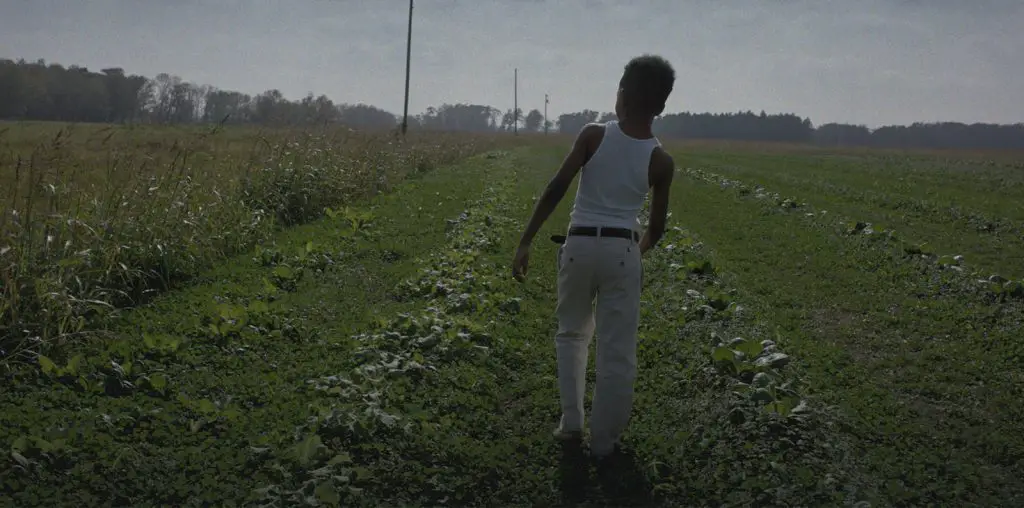
The complex social dynamics that keep the system of institutionalized rape in America’s prisons intact are too intricate to document in less than an hour. Nevertheless, that is exactly what this film tries, and fails, to do. “Turned Out” casts a wide net, endeavoring to cover the hierarchical nature of detention facilities as well as personal stories from inmates who have been sodomized, or “turned out”—and those who have done the turning out. Director Jonathan Schwartz has too many stories to tell, and no idea how to tell them. Obviously in over his head, he has chosen to rely on a pounding soundtrack and a music video-style montage aesthetic to, er, cover his a*s.
The editor must have been watching Busta Rhymes videos on ecstasy when devising the film’s cutting style. Bursts of white break up any shot longer than two seconds; flashbacks are rendered in sickening sepia tones; and unmotivated blur-dissolves propel the sequences from shot to shot. It also feels like the captions identifying people and places are an early exercise from the guy responsible for the dizzying subtitles in “Man on Fire.” The result is an ugly, spastic picture that ratchets up its “style” whenever Schwartz allows the substance to wane. The stories are harrowing enough, however, that this should never have happened.
The forcible assaults that, figures tell, claim one in five of all detainees, most happen to nonviolent drug offenders. These men face attacks from fellow inmates as well as guards, and risk being sold into the prison sex trade. Often, though, being turned out is part of a pecking order among prisoners, a way to group off into “families.” David Mendenhall, whose prison name became “Mindy” after he was turned out by LaMark Moore (known as Mark), joined such a gang after entering prison. “We was there for each other,” Mark explains.
Homosexuality is prevalent among prisoners, even for those who would be straight on the outside. “Wives,” “boys,” “babies,” and a long hierarchy of coerced dependence feed a black market that is, narrator Danny Trejo explains, “as exact as NASDAQ.” It is astonishing to hear David Wise, warden at Alabama’s Limestone Correctional Facility, admit that he turns a blind eye to the underground trade for sex, drugs, and vices like cigarettes to maintain the prison hegemony. “I know it goes on,” he says, “and it probably does have some element of helping us to keep control.”
Eliciting such candor from its subjects is this doc’s greatest strength. The inmates are all quite calm and matter-of-fact in their description of life behind bars, unnervingly so. But while they freely discuss many of the less savory aspects of prison life, there are surprisingly few revelations to be found. Much of the material covered here has already been dramatized (and, yes, aestheticized) in a number of prison dramas from “Shawshank” to “American History X” to “Oz.”
Only one segment, in which Mark and one of his cronies recount in excruciating detail how they turned out a new inmate, manages to convey in a truly visceral way the pure hell prisoners can face, and how that hell changes them. Mark tells us that, when he was on the street, he would never have considered doing the kinds of things he now does. He sums up the message of the film a little too patly, proclaiming, “Prison turned me out.”
While Schwartz obviously had noble intentions, he simply doesn’t show the skill his subject demands. He owes it to the victims to do more than just tell their story; he owes it to them to tell it well, and he has failed them. Too many plot threads are given just a cursory examination before Schwartz jumps to the next. The story flounders from subject to subject, inmate to inmate with no rhyme or reason for half an hour before suddenly realizing how interconnected the world it’s traveling through really is. Whole chunks of material are summed up in snippets of narration from Trejo, instead of being given an adequate amount of exploration.
It is heartening to know that an expanded, feature-length version of “Turned Out” is on its way. Perhaps Schwartz will use the extra time to think through his story a bit more logically; to hire a sound engineer to refine the audio mix, which is frequently overwhelmed by thumping hip-hop tracks; and to tackle some ancillary topics, such as life in women’s prisons, that are not touched on.
“Turned Out” could work well as a public service announcement, raising awareness of an issue that receives little serious attention, but rarely does it rise beyond those aspirations to something more. It is not investigative; aside from some Department of Corrections sting footage, there are no hidden cameras discovering heinous abuses. What Schwartz has created is more of an inside view of the prison culture, one that keeps sexual assault a constant reality for many inmates. If Schwartz and crew learn to navigate their subject matter with some degree of competence, they might actually accomplish something with this film.

Too many innocent boys getting Thierry a******s bustes, in pain and no one to tell. Prison officials look the other way just to keep violent sex offenders under control.
They let then f**k each other. Anyone who gets f****d in the a*s should sue the s**t out of everyon6.